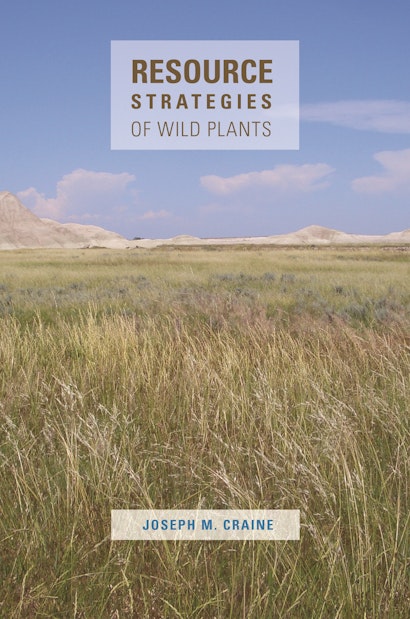Over millions of years, terrestrial plants have competed for limited resources, defended themselves against herbivores, and resisted a myriad of environmental stresses. These struggles have helped generate more than a quarter million terrestrial plant species, each possessing a unique strategy for success. Yet, as Resource Strategies of Wild Plants demonstrates, the constraints on plant growth are universal enough that a few survival strategies hold true for all seed-producing plants. This book describes the five major strategies of growth for terrestrial plants, details how plants succeed when resources are scarce, delves into the history of research into plant strategies, and resets the foundational understanding of ecological processes.
Drawing from recent findings in plant-herbivore interactions, ecosystem ecology, and evolutionary ecology, Joseph Craine explains how plants attain available nutrients, withstand the immense stresses of drying soils, and flourish in the race for light. He shows that the competition for resources has shaped plant evolution in newly discovered ways, while the scarcity of such resources has affected how plants interact with herbivores, wind, fire, and frost. An understanding of the major resource strategies of wild plants remains central to learning about the ecology of plant communities, global changes in the biosphere, methods for species conservation, and the evolution of life on earth.
Joseph M. Craine is assistant professor of biology at Kansas State University. He has conducted research throughout North America, New Zealand, Australia, and South Africa.
"This work would be excellent for a seminar/discussion-style course for undergraduate and especially graduate students."—Choice
"Joseph Craine provides an excellent synthesis of current work and a detailed historical perspective. . . . [T]his is a . . . very useful resource for anyone interested in the topic. . . . One of the strengths of this book is that . . . it also suggests the next crucial steps for fully understanding resource strategies of plants."—Marko Spasojevic, Journal of Vegetation Science
"This book provides an in-depth historical review and novel synthesis of resource strategies in wild plants. Craine identifies distinct strategies associated with high resource supply and limitations of nutrients, light, water, and carbon dioxide. This multiresource approach to plant strategies overcomes inconsistencies in earlier strategy frameworks and is well-grounded in ecological, biogeochemical, and evolutionary mechanisms that have shaped patterns of terrestrial plant diversity. This book will be a valuable resource for anyone interested in the functional diversity of the planet and its likely future changes."—F. Stuart Chapin III, University of Alaska, Fairbanks
"Accessible, concise, and clear, this book reviews and analyzes the main conceptual advances in plant ecology. A timely revision of plant strategies, it addresses fundamental questions, defines disciplines, and moves science forward."—Francisco I. Pugnaire, Spanish National Council for Scientific Research
"Joseph Craine is one of the few people in the world with the expertise to have written this book, and he has done it with rigor, substance, and style. There is nothing comparable in the ecological literature. Logically developed, well researched, efficient, and engaging, this book should be required reading for anyone with a professional interest in plant ecology."—Matthew P. Ayres, Dartmouth College

